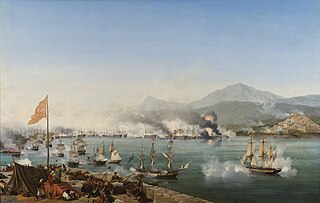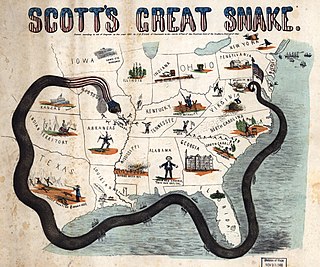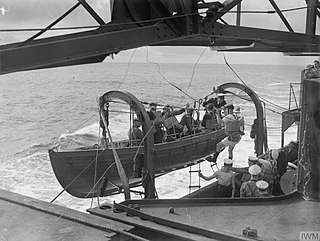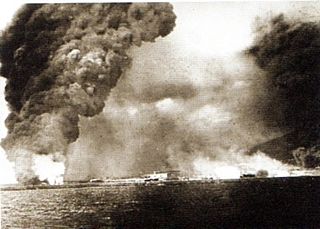
The Fourth Anglo-Dutch War was a conflict between the Kingdom of Great Britain and the Dutch Republic. The war, contemporary with the War of American Independence (1775–1783), broke out over British and Dutch disagreements on the legality and conduct of Dutch trade with Britain's enemies in that war.

The Battle of Navarino was a naval battle fought on 20 October 1827, during the Greek War of Independence (1821–29), in Navarino Bay, on the west coast of the Peloponnese peninsula, in the Ionian Sea. Allied forces from Britain, France, and Russia decisively defeated Ottoman and Egyptian forces which were trying to suppress the Greeks, thereby making Greek independence much more likely. An Ottoman armada which, in addition to Imperial warships, included squadrons from the eyalets (provinces) of Egypt and Algiers, was destroyed by an Allied force of British, French and Russian warships. It was the last major naval battle in history to be fought entirely with sailing ships, although most ships fought at anchor. The Allies' victory was achieved through superior firepower and gunnery.

An ultimatum is a demand whose fulfillment is requested in a specified period of time and which is backed up by a threat to be followed through in case of noncompliance. An ultimatum is generally the final demand in a series of requests. As such, the time allotted is usually short, and the request is understood not to be open to further negotiation. The threat which backs up the ultimatum can vary depending on the demand in question and on the other circumstances.

A blockade is the act of actively preventing a country or region from receiving or sending out food, supplies, weapons, or communications, and sometimes people, by military force. A blockade differs from an embargo or sanction, which are legal barriers to trade rather than physical barriers. It is also distinct from a siege in that a blockade is usually directed at an entire country or region, rather than a fortress or city and the objective may not always be to conquer the area.

A blockade runner is a merchant vessel used for evading a naval blockade of a port or strait. It is usually light and fast, using stealth and speed rather than confronting the blockaders in order to break the blockade. Blockade runners usually transport cargo, for example bringing food or arms to a blockaded city. They have also carried mail in an attempt to communicate with the outside world.
Swedish iron ore was an important economic and military factor in the European theatre of World War II, as Sweden was the main contributor of iron ore to Nazi Germany. The source of iron ore for Nazi Germany 1933–43 give the following average percentages when added together: Sweden 43.0 Domestic production 28.2 France 12.9. Within the German military the Navy was most dependent on Swedish steel as an absolute necessity to the German war effort, according to their grand admiral. It has also been argued that the Swedish export helped prolong the war.

The Paris Declaration respecting Maritime Law of 16 April 1856 was an international multilateral treaty agreed to by the warring parties in the Crimean War gathered at the Congress at Paris after the peace treaty of Paris had been signed in March 1856. As an important juridical novelty in international law the treaty for the first time created the possibility for nations that were not involved in the establishment of the agreement and did not sign, to become a party by acceding the declaration afterwards. So did altogether 55 nations, which otherwise would have been possible in such a short period. This represented a large step in the globalisation of international law.

During the Napoleonic Wars, the Anglo-Russian War was the phase of hostilities between Great Britain and Russia after the latter signed the Treaty of Tilsit that ended its war with France. Anglo-Russian hostilities were limited primarily to minor naval actions in the Baltic Sea and Barents Sea.
The Milan Decree was issued on 17 December 1807 by Napoleon I of France to enforce the 1806 Berlin Decree, which had initiated the Continental System, the basis for his plan to defeat the British by waging economic warfare.
These Orders in Council were a series of decrees, in the form of Orders in Council, made by the Privy Council of the United Kingdom in the course of the wars with Napoleonic France which instituted its policy of commercial warfare. The Orders are important for the role they played in shaping the British war effort against France, but they are also significant for the strained relations—and sometimes military conflict—they caused between Great Britain and neutral countries, whose trade was affected by them.

Naval warfare in World War I was mainly characterized by blockade. The Allied Powers, with their larger fleets and surrounding position, largely succeeded in their blockade of Germany and the other Central Powers, whilst the efforts of the Central Powers to break that blockade, or to establish an effective counter blockade with submarines and commerce raiders, were eventually unsuccessful. Major fleet actions were extremely rare and proved less decisive.
The Don Pacifico affair was a diplomatic episode which occurred in 1850 and concerned the governments of Greece, the United Kingdom and Portugal, and is considered an example of gunboat diplomacy. The affair is named after David Pacifico, a Jewish British subject born in Gibraltar. He had previously been Portuguese consul-general to Greece, dismissed from his consulship for exceeding his authority repeatedly during 1842, but he continued to reside in Athens.

Dmitry Nikolayevich Senyavin or Seniavin was a Russian admiral during the Napoleonic Wars.

In admiralty law prizes are equipment, vehicles, vessels, and cargo captured during armed conflict. The most common use of prize in this sense is the capture of an enemy ship and her cargo as a prize of war. In the past, the capturing force would commonly be allotted a share of the worth of the captured prize. Nations often granted letters of marque that would entitle private parties to capture enemy property, usually ships. Once the ship was secured on friendly territory, she would be made the subject of a prize case: an in rem proceeding in which the court determined the status of the condemned property and the manner in which the property was to be disposed of.
The Confederate privateers were privately owned ships that were authorized by the government of the Confederate States of America to attack the shipping of the United States. Although the appeal was to profit by capturing merchant vessels and seizing their cargoes, the government was most interested in diverting the efforts of the Union Navy away from the blockade of Southern ports, and perhaps to encourage European intervention in the conflict.

The first League of Armed Neutrality was an alliance of European naval powers between 1780 and 1783 which was intended to protect neutral shipping against the Royal Navy's wartime policy of unlimited search of neutral shipping for French contraband during the American Revolutionary War and Anglo-French War. According to one estimate, 1 in 5 merchant vessels did not make it to port safely due to the British policy. By September 1778, at least 59 ships had been taken prize – 8 Danish, 16 Swedish and 35 Dutch, not mentioning others from Prussia. Protests were enormous by every side involved.

The U-boat Campaign from 1914 to 1918 was the World War I naval campaign fought by German U-boats against the trade routes of the Allies. It took place largely in the seas around the British Isles and in the Mediterranean. The German Empire relied on imports for food and domestic food production and the United Kingdom relied heavily on imports to feed its population, and both required raw materials to supply their war industry; the powers aimed, therefore, to blockade one another. The British had the Royal Navy which was superior in numbers and could operate on most of the world's oceans because of the British Empire, whereas the Imperial German Navy surface fleet was mainly restricted to the German Bight, and used commerce raiders and unrestricted submarine warfare to operate elsewhere.

The Capture of the Rosily Squadron, also known as the Battle of Poza de Santa Isabel, took place on 14 June 1808, in Cádiz, Spain, following the uprising against the French invaders. Five French ships of the line and a frigate were in the port, having remained there under blockade since the Battle of Trafalgar, nearly three years earlier. After an engagement with the Spanish lasting five days, French Admiral François Étienne de Rosily-Mesros surrendered his entire squadron with the four thousand seamen then on board.

The Blockade of Germany (1939–1945), also known as the Economic War, involved operations carried out during World War II by the British Empire and by France in order to restrict the supplies of minerals, fuel, metals, food and textiles needed by Nazi Germany – and later by Fascist Italy – in order to sustain their war efforts. The economic war consisted mainly of a naval blockade, which formed part of the wider Battle of the Atlantic, but also included the bombing of economically important targets and the preclusive buying of war materials from neutral countries in order to prevent their sale to the Axis powers.

The Black Sea raid was an Ottoman naval sortie against Russian ports in the Black Sea on 29 October 1914, supported by Germany, that led to the Ottoman entry into World War I. The attack was conceived by Ottoman War Minister Enver Pasha, German Admiral Wilhelm Souchon, and the German foreign ministry.














